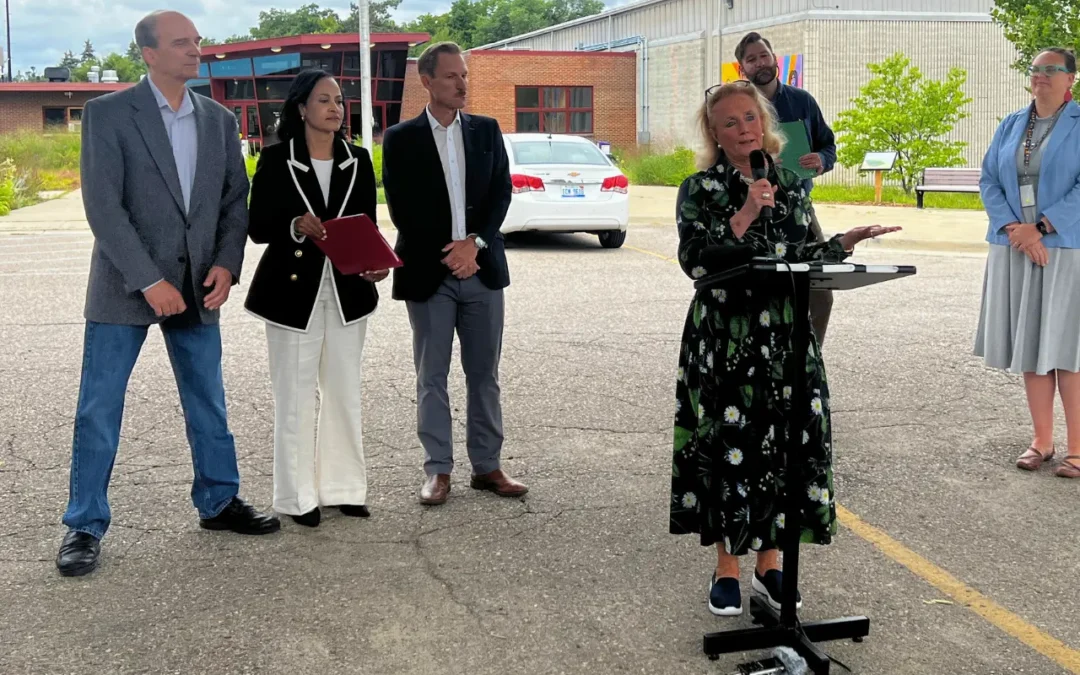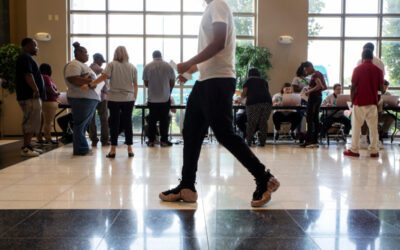
Legislation set to be introduced in the state Senate would protect Michigan workers by capping the annual percentage rate for payday loans at 36%. State lawmakers said the reforms could stop families from spiraling into debt.
MICHIGAN— State Sen. Sarah Anthony (D-Lansing) and Rep. Abraham Aiyash (D-Hamtramck) introduced legislation this week that they say will reform an exploitative system of payday loans that they blame for trapping thousands of Michiganders in an “endless cycle of debt.”
And unlike some legislation that passes through Lansing, this bill isn’t being pushed by lobbyists or sponsored by any big-money interest groups, Anthony said. This one is purely for the people.
“We have supported all sorts of folks in this Capitol,” Anthony told reporters on Wednesday. “We’ve given much support to corporations, businesses—small and large. We have done a lot for everyone. The least that we can do is also be helping to lift people out of poverty—to actually not only look out for the big guys, but look out for our neighbors and friends who do not have well-paid lobbyists, well-paid interest groups that line our halls to make sure that they get their interests back. Sometimes we have to stand in the gap for working Michiganders.”
What’s a payday loan?
A payday loan is a short-term, high-cost deal where Michigan workers can quickly borrow up to $600 ahead of their next paycheck, typically to cover emergencies and other unexpected expenses—like an unforeseen medical bill, replacing an appliance, or repairing a vehicle.
They’re also frequently advertised as “cash advance” loans.
Michiganders either grant lenders direct access to their bank accounts, or write them a personal check for the amount borrowed, plus a service fee that is capped by state law at 11-15% of the loan. Full repayment (including the service fee) is typically required by their next payday.
What’s the problem?
The two-week repayment schedules and high fees on those loans translate to triple-digit annual percentage rates and unaffordable payments that have sent thousands of Michiganders spiraling into a cycle of debt that siphons an estimated $1 million out of the state’s economy every year.
For example:
A two-week loan of $100 that includes the state’s maximum allowable service fee of $15 would carry an APR of more than 390%—along with the possibility of added fees for checking customer eligibility. A $600 loan would translate to a 330% APR, including the maximum fees.

And with nothing in state law to stop lenders from stringing loans together so that Michiganders can just pay off their existing loan with a fresh one, Anthony said the system has created an “exploitative” cycle of service fees and perpetual debt—particularly in Black and brown communities where payday lending shops are much more likely to offer their services.
“This industry markets loans as short term, but by design they trap the vast majority of borrowers in a cycle of debt that, more often than not, results in bankruptcy,” Anthony said at a press conference. “We have heard too many stories in our communities—like right here in Lansing, and across the state—that we must act now to address these predatory practices.”
Federal estimates show that about 70% of Michiganders who utilize payday loans will take out another loan on the same day they’ve repaid one, MLive reports. In 2016, roughly 91% of Michigan borrowers also returned for another loan within two months of paying off their last one.
Anthony said the vast majority of payday lenders in Michigan are also located in predominantly Black and brown communities, and focus most of their advertisements in those communities.
“This is by design. This is what makes this system so exploitative,” she said.
Aiyash also said that most of Michigan’s payday lenders are based in other states and collect more than $1 million a year in fees that would otherwise remain in Michiganders’ pockets.
He also told reporters about a friend who took out a $600 payday advance loan to replace a refrigerator, but ultimately found himself trapped in a cycle of debt for 12 years after taking out one loan to pay off another, and absorbing thousands of dollars in service fees along the way.
“This is a serious, serious problem in the state of Michigan and quite frankly, we are behind in terms of addressing this issue,” Aiyash said. “If we put a stop to these predatory lenders, Michiganders are going to have more access to the money they make and … that will stimulate our economy. Their quality of life will improve. Importantly, it will also allow them to build assets.”
What’s the plan?
The legislation announced this week would put a new APR cap on payday loans of 36%—which would be inclusive of all service fees, and serve to drastically reduce the cost of repayment.
According to the Center for Responsible Lending, the 36% cap—which has already been enacted in at least 18 other states—would lower the cost of repayment so significantly that Michiganders would essentially be protected from spiraling into debt through payday loans.
Beyond citing the importance of having “clear, bright lines” for borrowers and lenders, the National Consumer Law Center also bills the 36% mark as the dividing line between affordable small-dollar loans and unaffordable, potentially predatory ones. The structure also encourages lenders to offer longer installment loans with more affordable payments and an honest term.
Support for capping payday loans at 36% has also reportedly drawn wide, bipartisan support in the states where the reforms have been enacted—and they’ve since led to a total consumer savings of more than $2.2 billion annually, according to the Michigan League for Public Policy.
“High-cost loans also often hamper a family’s ability to make ends meet, resulting in more dependency on food assistance, delayed payments for medical care and rent, missed child support payments, and even an increased likelihood of bankruptcy, which can be catastrophic for families and children,” League President Monique Stanton said in a statement this week.
READ MORE: Bills seek to provide Michiganders with paid family and medical leave
For the latest Michigan news, follow The ‘Gander on Twitter.
Follow Political Correspondent Kyle Kaminski here.
Support Our Cause
Thank you for taking the time to read our work. Before you go, we hope you'll consider supporting our values-driven journalism, which has always strived to make clear what's really at stake for Michiganders and our future.
Since day one, our goal here at The 'Gander has always been to empower people across the state with fact-based news and information. We believe that when people are armed with knowledge about what's happening in their local, state, and federal governments—including who is working on their behalf and who is actively trying to block efforts aimed at improving the daily lives of Michigan families—they will be inspired to become civically engaged.


Nessel seeks to slash DTE half-billion-dollar rate hike request by 75%
BY BEN SOLIS, MICHIGAN ADVANCE MICHIGAN—Attorney General Dana Nessel filed testimony on Friday in DTE Energy’s latest rake hike request, which is...

Michigan leaders say Trump’s hatred of clean energy will hike utility bills, kill jobs
Clean energy advocates say President Donald Trump’s “One Big Beautiful Bill Act” is raising utility costs, canceling solar projects, and putting...

Here’s how many Michiganders in Flint and the Tri-Cities will lose SNAP benefits in 2025—and the elected politician who tried to stop it
Trump’s tax bill will take around 46,000 people off SNAP in Michigan’s 8th Congressional District. Rep. Kristen McDonald Rivet voted against it....

Here’s how many people in Southwest Michigan will lose SNAP benefits in 2025—and the elected politician who made it happen
About 25,000 people in the Holland-Kalamazoo region are waiting to hear if Rep. Bill Huizenga will run for reelection in 2026, after he voted to...

Here’s how many Michiganders in Macomb and Oakland counties will lose SNAP benefits in 2025—and the elected politician who made it happen
The representative who voted to take away food benefits from around 36,000 people in his district plans to run for governor. President Donald Trump...




